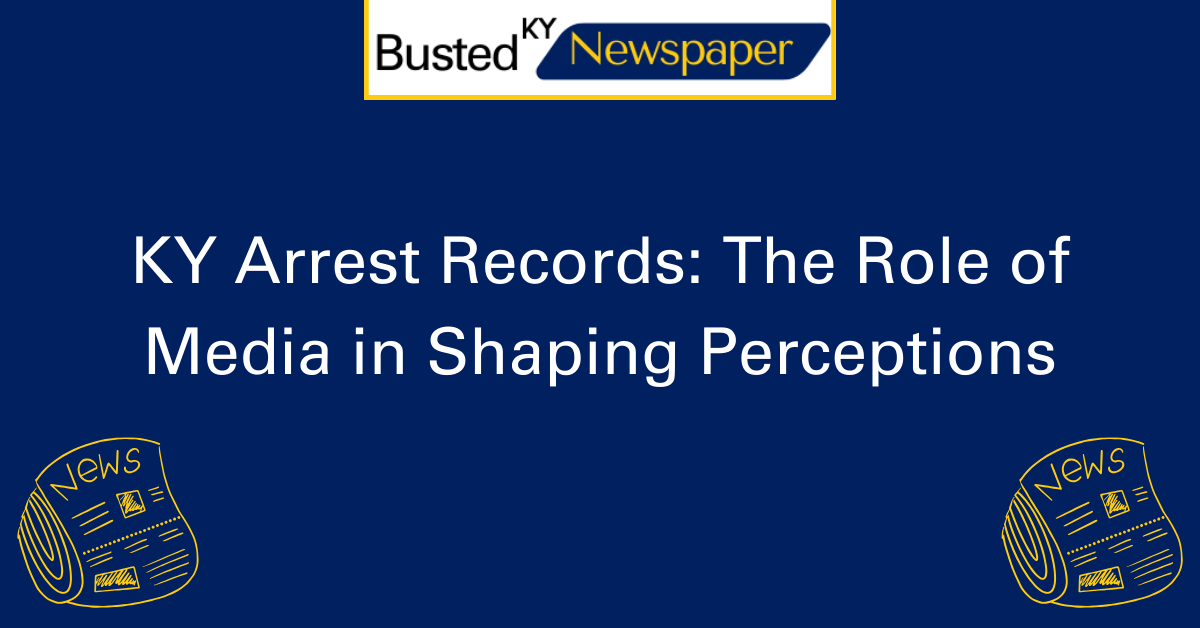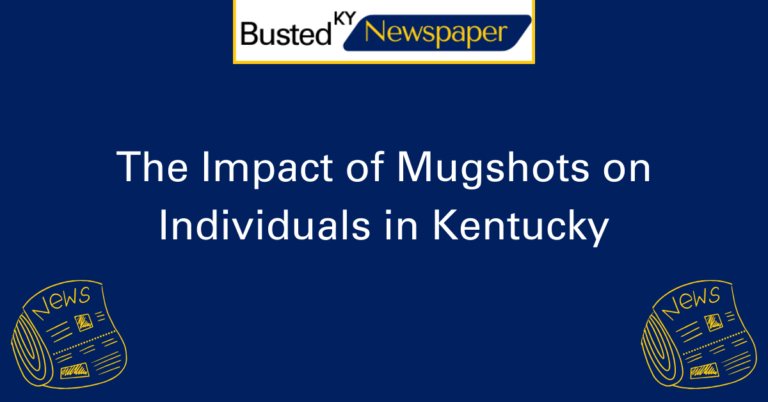KY Arrest Records: The Role of Media in Shaping Perceptions
Explore the fascinating world of KY arrest records and discover the powerful influence of media in shaping our perceptions. In today’s digital age, information spreads rapidly, and it is crucial to understand how media can impact our understanding of crime and justice. From sensational headlines to biased reporting, the media plays a significant role in shaping public opinion and influencing our views on law enforcement.
Gain insight into how news outlets select and present information, and the potential consequences of their choices. Uncover how media narratives can shape public opinion, influence policy decisions, and impact the lives of individuals involved in the criminal justice system. Whether you are a concerned citizen, a student of media studies, or a legal professional, this exploration into the role of media in shaping perceptions will provide you with valuable insights into this complex and important topic.
The Impact of Sensational Headlines
When it comes to media coverage of KY arrest records, one cannot ignore the power of sensational headlines. These attention-grabbing titles often emphasize the most shocking or controversial aspects of a story, drawing in readers or viewers. However, it is important to recognize the potential consequences of such sensationalism.
By focusing on the most extreme cases or highlighting specific details out of context, sensational headlines can distort the reality of crime and justice. This can lead to a skewed perception of the criminal justice system, creating fear and anxiety among the public. It is crucial to approach media coverage with a critical eye and seek out reliable sources that provide a balanced and nuanced perspective.
Unveiling Biased Reporting and Its Influence
Biased reporting is another significant factor to consider when exploring the relationship between KY arrest records and the media. Journalists and news outlets may have their agendas or biases that can impact the way they present information.
Whether it is through selective reporting, omission of crucial details, or the use of loaded language, biased reporting can shape public opinion and perpetuate stereotypes. Consumers of news need to be aware of these biases and seek out diverse sources of information to gain a more comprehensive understanding of the issues at hand.
The Ripple Effect: Media Narratives and Public Opinion
Media narratives have the power to shape public opinion and influence policy decisions. When news outlets consistently portray individuals involved in the criminal justice system in a negative light, it can contribute to stigmatization and perpetuate harmful stereotypes.
These narratives can have tangible consequences for individuals’ lives, affecting their ability to secure employment, find housing, or reintegrate into society after serving their sentences. It is crucial to critically evaluate media narratives and consider their potential impact on the lives of those affected by the criminal justice system.
The Role of Media in Policy Decisions
Media coverage of KY arrest records can also play a significant role in shaping policy decisions. Public perception, driven by media narratives, can influence lawmakers and policymakers to prioritize certain issues or adopt specific strategies.
It is important to recognize the responsibility of both the media and the public to ensure that policy decisions are based on accurate information and a comprehensive understanding of the complexities of crime and justice. By actively engaging with different perspectives and seeking out diverse sources of information, we can contribute to more informed and effective policy-making processes.
Empowering Knowledge and Responsible Media Consumption
As concerned citizens, students of media studies, or legal professionals, it is essential to engage in critical thinking and responsible media consumption when it comes to KY arrest records and the influence of media. By staying informed, questioning biases, and seeking out reliable sources, we can ensure that our perceptions are based on accurate information.
Through this exploration into the role of media in shaping perceptions, we have gained valuable insights into the complex relationship between KY arrest records and the media. It is our collective responsibility to promote a more accurate and nuanced understanding of crime and justice, one that is not solely shaped by sensationalism or biases, but by a commitment to truth and justice.
FAQ’s
Understanding the influence of media on perceptions of crime and justice is crucial in today’s digital age. Media plays a significant role in shaping public opinion and influencing our views on law enforcement. By exploring this influence, we can gain insight into how media narratives are constructed and understand the potential consequences of biased reporting and sensational headlines.
Media narratives can significantly impact public opinion regarding the criminal justice system. Biased reporting and sensationalized headlines can create a distorted view of crime and justice, leading to misconceptions and stereotypes. Media has the power to influence public perception of law enforcement, policy decisions, and the lives of individuals involved in the criminal justice system.
Exploring the role of media in shaping perceptions of crime and justice can benefit a wide range of individuals. Concerned citizens can gain a deeper understanding of how media influences their perceptions and make more informed judgments. Students of media studies can explore the intricate relationship between media and the criminal justice system. Legal professionals can identify the potential consequences of media bias and sensationalism in their work.
By exploring the relationship between KY arrest records and the media, you can gain valuable insights into how news outlets select and present information. You can understand the potential consequences of their choices and how media narratives can shape public opinion, influence policy decisions, and impact the lives of individuals involved in the criminal justice system. This exploration provides a comprehensive understanding of the complex and important topic of media’s role in shaping perceptions of crime and justice.







